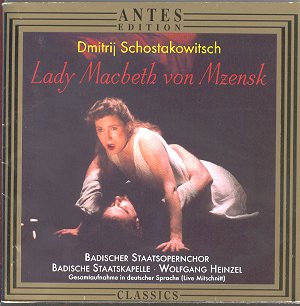Dmitri SHOSTAKOVICH (1906-1975)
The Lady Macbeth of the Mtsensk District (1932)
Opera in four acts and nine scenes (original version, sung in German)
 Boris Timofejevitch Ismailov,
Oleg Bryiak (bass)
Boris Timofejevitch Ismailov,
Oleg Bryiak (bass)
Sinovi Borissovitch Ismailov, his son, Jason Alexander (tenor)
Katerina Lvovna Ismailova, wife of Sinovi, Anna Katharina Behnke (soprano)
Sergei, Stephen Ibbotson (tenor)
Axinia, Christina Rösch (soprano)
Badisches Staatskapelle, Badische Staatsopernchor/Wolfgang Heinzel
Live recording (DDD) from Badisches Staatstheater, Karlsruhe, June 1996.
(Sung in German)
 ANTES EDITION BM-CD 15.9001.
3 CDs [CD1 49.32, CD2 52.31, CD3
60.50]
ANTES EDITION BM-CD 15.9001.
3 CDs [CD1 49.32, CD2 52.31, CD3
60.50]

Shostakovich was among the few eminent Russian composers who continued to
work creatively within the Communist cultural system. His output can broadly
be divided into works intended for a wider public and those that reflect
his complex musical personality. To some extent this - his only opera apart
from a one-act burlesque, The Nose - encompasses both worlds.
Superficially it is a lurid tale of crime and punishment, but can also be
regarded as a struggle between personal freedom and persecution, though whether
this was Shostakovich's true intention remains obscure. In 1936 it was savaged
by Russia's cultural czars (as detailed in the excellent booklet that accompanies
this set), a Philistine reaction that stemmed from Stalin's personal disapproval
of a work which he described as "anti-Bolshevik … chaos instead of music
… yelling and shrieking"), a view dutifully echoed by the party newspaper,
Pravda, ("disharmonic … a chaotic flood of sounds"). In 1936
the opera was withdrawn from public performance, but twenty-five years later
Shostakovich extensively revised it, omitting "controversial" scenes. As
Katerina Izmailova this version was presented for the first time in
Moscow in 1963. There can be little doubt which is the greater work, both
musically and dramatically, as this recording, based on the original 1932
score, amply confirms.
In the two years prior to its withdrawal by the composer (with a cringing
public "apology to the Soviet people") The Lady Macbeth received two
hundred performances before enthusiastic audiences in Leningrad and Moscow,
and was frequently presented outside the Soviet Union. Shostakovich explained
that he wished it to describe "the fate of a woman who endures terrible life
conditions in the age she is living through", adding "I want to explain all
her crimes in this light, not through an inclination to be blood-thirsty".
Analogies between Katerina's entrapment and State persecution are at least
credible, so maybe Stalin was not that short-sighted after all! On the surface
the plot is a simple story of crime and punishment, but there are veiled
allusions to deeper issues of collective stupidity and cruelty.
Based on a short story by Nicolai Leskov, The Lady Macbeth
makes Shakespeare's Scottish play seem almost sentimental by comparison,
though the atmosphere of doom and guilt that pervades Macbeth is
chillingly recreated in Shostakovich's score. For its time, the music is
not particularly "difficult" (less so than, for example, Alban Berg's Wozzek
(1925) and Lulu (1935)). There is pathos, and even tenderness,
in Anna Katherina Behnke's Katarina. Her voice is thrilling and flexible
throughout, and her tormentor, Boris, is well-portrayed by the high bass
of Oleg Bryiak. Lyrical passages and satire and a typically Russian relish
in unmitigated pessimism do little to soften the atmosphere of doom and gloom
as the tale unfolds.
The story explores many dark byways, but in bare outline is fairly
straightforward: in Act I the cook, Aksinya, tells Katerina that a newly-hired
labourer, Sergei, has been dismissed for having an affair with his master's
wife. Sleepless, alone and brooding over her loveless marriage, Katerina
allows Sergei to enter her bedroom on the pretext of borrowing a book. Mistaking
his apparent sympathy she confesses a hatred of her husband and is seduced.
In Act II Katerina's jealous father-in-law Boris discovers Sergei leaving
Katerina's room, whips him in front of the labourers, locks him in a garret
and demands food. Katerina gives him poisoned mushrooms and, as he dies,
steals the garret key to release Sergei. When Sinovi, her husband, returns
he accuses Katerina of being unfaithful. She calls on Sergei for help and,
together, they kill Sinovi and hide his body in the cellar. The local labourers
believe that he has been accidentally drowned, but in Act III his corpse
is discovered. Katerina and Sergei are arrested and sent to Siberia. En route
Sergei deserts Katerina for a younger woman, Sonyetka. Katerina throws her
rival into a river and drowns herself. This may be the raw stuff of melodrama,
but Shostakovich's subtle score constantly highlights underlying tensions
that go deeper than mere blood and thunder.
The opera opens without overture or preamble, but plenty of orchestral colour.
It is soon clear that, however abstract the ideas hidden within the story
may be, here we have full-blooded, no-holds-barred theatre, with deft portrayals
and plenty of "acting with the voice". Unlike Shakespeare's anti-heroine
- and despite her murderous deeds - Katerina stirs our sympathy and compassion.
The choral sections (labourers, peasants and prisoners) are particularly
well handled. The risks of recording a live performance are avoided in a
production with pace, commitment, subtle characterisations and a feeling
of immediacy and conviction.
Complete recordings of The Lady Macbeth have
been scarce of late. Rostropovich's 1993 performance on EMI Classics
holds up well and a fair number of excerpts and highlights turn up from
time to time. This dedicated performance, with excellent sound and thrilling
voices, should not be missed, not least for the tense, well-rehearsed
orchestra.
Roy Brewer
CONTACT DETAILS
Bella Musica Edition
distribution@bellamusica.de
Bella Musica Edition (Antes Edition)
Eisenbahnstr. 30
D- 77815 BÜHL
Telephone: +49 (0)7223-98550
Telefax: +49 (0)7223-985566

